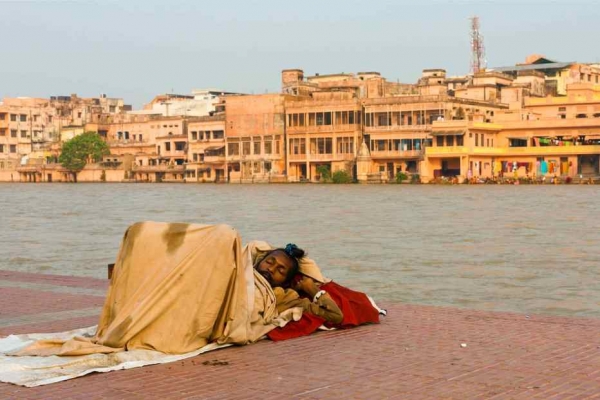 It should go without saying that
It should go without saying that
housing is essential to well-being, even life. It is so much more than a
physical space or structure. It’s where we develop our first social
relationships, it ties us to our communities, and it’s connected to our
livelihoods. Just as housing goes beyond four walls and a roof, homelessness is
not about just the lack of a house.
When asked to describe someone who is
homeless, what comes to mind for most is a person (often an older man) sleeping
rough on the street, without so much as a roof for protection. While this is a
devastating reality for many who are homeless across the globe, this image is
just one segment of the world’s homeless.
Go deeper and we see that, around the
world, millions upon millions of people are invisibly homeless. This includes
women, children and youths who find refuge with others, doubled or tripled up.
This also includes multiple-generation families living in crammed shacks
lacking even the most basic services, who at a moment’s notice may be evicted,
often for a second or third time.
A homeless man sleeps next to the Ganges River
in
Haridwar, India. (Pius Lee/Shutterstock
And then there’s the aspect of
homelessness that is rarely mentioned, let alone tackled: criminalization,
discrimination and stigmatization. Homeless people are often denied access to
basic services such as water or sanitation, and are even fined for engaging in
activities necessary for their own survival — for instance, eating and sleeping
in public spaces. They are treated like “human waste”, sometimes forced to
establish their households on or next to garbage dumps.
Homelessness is not just one of the
most extreme forms of physical deprivation; it also defines a group that is
subject to extreme forms of discrimination and violence. For homeless people,
it’s double jeopardy: Laws and policies create homelessness and then penalize
homeless people for being homeless.
[See: Home is where we practice citizenship, Habitat III stakeholders say]
Understanding homelessness in its
narrowest sense naturally results in narrow policy responses, which often focus
on the creation of more houses. Though rational in intent, this “feed the
hungry” approach ignores underlying causes of homelessness, fails to address
stigmatization and criminalization of homeless people, and completely sidesteps
any critical analysis of preventative measures.
In order to broaden the response to
homelessness and thus effectively address it, we need a paradigm shift. We have
to move away from an exclusive focus on the individual circumstances leading to
and arising out of homelessness, toward a focus that recognizes the structural
causes of it as well as its individualized dimensions.
A human rights framework is a good
starting point.
[See: Human rights and the New Urban Agenda]
Governments should take note and ensure
the right to housing is centre stage at the upcoming U. N.Conference on Housing and Sustainable Urban
Development, the conference commonly known
as Habitat III that takes place in October. Unfortunately, the
crisis of homelessness and the recognition of housing as a human right have not
dominated discussions in the lead up to the conference, leaving a wide gap
between housing policy and government obligations.
Root causes
If housing were approached as a human
right, then homelessness — visible or invisible — would necessarily be
recognized as the failure of States to implement it. This shift in perspective
moves us past the initial urge to blame the victim and instead focuses
attention on State action or inaction.
Such an approach would expose the many
root causes of homelessness. These include, for instance, States abandoning the
responsibility for social protection in the context of unprecedented
urbanization; implementing laws and policies that discriminate against homeless
people; and failing to adequately regulate real-estate markets, land
distribution and private actors in keeping with human rights obligations.
[See: Connecting
housing with sustainable urbanization in the New Urban Agenda]
As a first step, I am calling on all
States to make a firm commitment to ending homelessness, including its causes,
by 2030. While daunting, the timing is ripe in light of the global commitment
by States to tackle poverty and ensure access to adequate housing for all by
this date under the recently agreed Sustainable Development Goals.
Habitat III has the potential to act as an influential force
towards achieving this goal if the right to housing and homelessness are
considered critical factors in the development of the New Urban Agenda, the 20-year urbanization strategy that will
come out of October’s conference..
This will require governments to shift
the dialogue and vision around housing policy, and to commit resources in a
manner that corresponds with obligations under the right to housing. A
rights-based approach brings clarity, outlining responsibilities as well as
important next steps, such as creating a national homelessness strategy and
developing deeper definitions of homelessness.
[See: Habitat III must
rethink the role of housing in sustainable urbanization]
I believe a flexible and inclusive
definition is necessary. This needs to focus on the most desperate, to
recognize homeless people as rights-bearers, and to consider social dimensions
as well as structural causes of homelessness. New measurements of homelessness
can be adopted to support this with qualitative data supplementing quantitative
methods so that prevention and underlying causes can be identified and
addressed.
Alongside these changes, homeless
individuals should be given opportunities to claim their rights and access
effective remedies. Tribunals, courts or human rights institutions are examples
of ways in which States can offer access to justice and ensure that the rights
of the homelessness do not go ignored.
These are a few of the critical
elements missing when we fail to view homelessness as a violation of human
rights.
Without doubt, building houses will be
part of any strategy to eliminate homelessness. But only a human rights
response can address what is fundamentally a human rights failure.
Leilani Farha will be presenting her report on
homelessness to the U. N.Human Rights
Council on 3 March and hosting